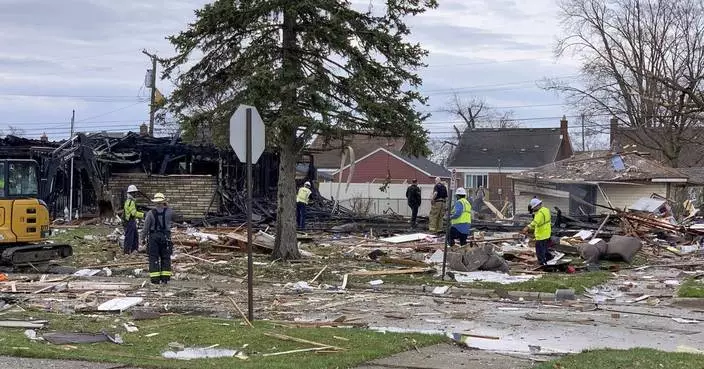AUCKLAND, New Zealand (AP) — America's Cup winner Emirates Team New Zealand won't be able to stage the next edition of the sailing competition at home in Auckland after failing to secure support from the local government.
The team led by Grant Dalton won its third consecutive cup in October in Barcelona, adding to wins in 2017 in Bermuda and 2021 in Auckland.
Many of the team’s fans back home had been disappointed when Dalton took the cup from Auckland to Spain in search of better financing, but he will now have to do it again for the 2027 edition.
“It is with both disappointment and understanding to hear (government officials) have decided not to back the 38th America’s Cup in Auckland in 2027,” the team said in a statement. “We understand there are other priorities for the New Zealand Government right now.”
The defender can keep the competition in Barcelona, or Saudi Arabia is also an option after it hosted a preliminary regatta in 2023.
AP sports: https://apnews.com/hub/sports

FILE - Emirates Team New Zealand CEO Grant Dalton raises his hand as the crew celebrates after winning the Louis Vuitton 37th America's Cup in Barcelona, Spain, Saturday, Oct.19, 2024. (AP Photo/Bernat Armangue, File)
POINTE À LA HACHE, La. (AP) — Oil company Chevron must pay at least $740 million to restore damage it caused to southeast Louisiana's coastal wetlands, a jury ruled on Friday following a landmark trial more than a decade in the making.
The case was the first of dozens of pending lawsuits to reach trial in Louisiana against the world’s leading oil companies for their role in accelerating land loss along the state’s rapidly disappearing coast. The verdict – which Chevron says it will appeal – could set a precedent leaving other oil and gas firms on the hook for billions of dollars in damages tied to land loss and environmental degradation.
Jurors found that energy giant Texaco, acquired by Chevron in 2001, had for decades violated Louisiana regulations governing coastal resources by failing to restore wetlands impacted by dredging canals, drilling wells and billions of gallons of wastewater dumped into the marsh.
The jury awarded $575 million to compensate for land loss, $161 million to compensate for contamination and $8.6 million for abandoned equipment — a total of $744.6 million. Including interest from when the lawsuit was filed in 2013, the amount earmarked for restoration exceeds $1.1 billion, according to attorneys for Talbot, Carmouche & Marcello, the firm behind the lawsuit.
The parish had asked for $2.6 billion in damages.
“No company is big enough to ignore the law, no company is big enough to walk away scot-free,” the plaintiff’s lead attorney John Carmouche told jurors during closing arguments.
A 1978 Louisiana coastal management law mandated that sites used by oil companies “be cleared, revegetated, detoxified, and otherwise restored as near as practicable to their original condition” after operations ended. Older operations sites that continued to be used were not exempt and companies were expected to apply for proper permits.
But the oil company did not obtain proper permits and failed to clean up its mess, leading to contamination from wastewater stored unsafely or dumped directly into the marsh, the lawsuit said.
The company also failed to follow known best practices for decades since it began operating in the area in the 1940s, expert witnesses for the plaintiff’s testified. The company “chose profits over the marsh" and allowed the environmental degradation caused by its operations to fester and spread, Carmouche said.
Chevron's lead trial attorney Mike Phillips said in a statement following the verdict that “Chevron is not the cause of the land loss occurring” in Plaquemines Parish and that the law does not apply to “conduct that occurred decades before the law was enacted.”
Phillips called the ruling “unjust” and said there were “numerous legal errors.”
The lawsuit against Chevron was filed in 2013 by Plaquemines Parish, a rural district in Louisiana straddling the final leg of the Mississippi River heading into the Gulf of Mexico, also referred to as the Gulf of America as declared by President Donald Trump.
Louisiana’s coastal parishes have lost more than 2,000 square miles (5,180 square kilometers) of land over the past century, according to the U.S. Geological Survey, which has also identified oil and gas infrastructure as a significant cause. The state could lose another 3,000 square miles (7,770 square kilometers) in the coming decades, its coastal protection agency has warned.
Thousands of miles of canals cut through the wetlands by oil companies weakens them and exacerbates the impacts of sea level rise. Industrial wastewater from oil production degrades the surrounding soil and vegetation. The torn up wetlands leave South Louisiana – home to some of the nation’s biggest ports and key energy sector infrastructure -- more vulnerable to flooding and destruction from extreme weather events like hurricanes.
Chevron’s lead attorney, Mike Phillips, said the company had operated lawfully and blamed land loss in Louisiana on other factors, namely the extensive levee system that blocks the Mississippi River from depositing land regenerating sediment — a widely acknowledged cause of coastal erosion.
The way to solve the land loss problem is “not suing oil companies, it’s reconnecting the Mississippi River with the delta,” Phillips said during closing arguments.
Yet the lawsuit held the company responsible for exacerbating and accelerating land loss in Louisiana, rather than being its sole cause.
Chevron also challenged the costly wetlands restoration project proposed by the parish, which involved removing large amounts of contaminated soil and filling in the swaths fragmented wetlands eroded over the past century. The company said the plan was impractical and designed to inflate the damages rather than lead to real world implementation.
Attorney Jimmy Faircloth, Jr., who represented the state of Louisiana, which has backed Plaquemines and other local governments in their lawsuits against oil companies, told jurors from the parish that Chevron was telling them their community was not worth preserving.
“Our communities are built on coast, our families raised on coast, our children go to school on coast,” Faircloth said. “The state of Louisiana will not surrender the coast, it’s for the good of the state that the coast be maintained.”
Carmouche, a well-connected attorney, and his firm have been responsible for bringing many of the lawsuits against oil companies in the state.
Louisiana’s economy has long been heavily dependent on the oil and gas industry and the industry holds significant political power. Even so, Louisiana’s staunchly pro-industry Gov. Jeff Landry has supported the lawsuits, including bringing the state on board during his tenure as Attorney General.
Oil companies have fought tooth and nail to quash the litigation, including unsuccessfully lobbying Louisiana’s Legislature to pass a law to invalidate the claims. Chevron and other firms also repeatedly tried to move the lawsuits into federal court where they believed they would find a more sympathetic audience.
But the heavy price Chevron is set to pay could hasten other firms to seek settlements in the dozens of other lawsuits across Louisiana. Plaquemines alone has 20 other cases pending against oil companies.
The state is running out of money to support its ambitious coastal restoration plans, which have been fueled by soon-expiring settlement funds from the Deepwater Horizon oil spill, and supporters of the litigation say payouts could provide a much-needed injection of funds.
Attorneys for the parish said they hope that big payout will prompt more oil companies to come to the table and engage in coastal restoration.
“We continue to fight to restore the coast,” said Don Carmouche, an attorney with the firm representing the parish and other local governments which have filed suit. “All the parishes want is for the companies to come together for reasonable restoration of the coast.”

FILE - Wetlands are seen from a helicopter on the Louisiana coast on July 10, 2010. (AP Photo/Patrick Semansky, File)

FILE - This Tuesday, May 2, 2017, photo shows a Chevron sign at a gas station in Miami. (AP Photo/Alan Diaz, File)



















































